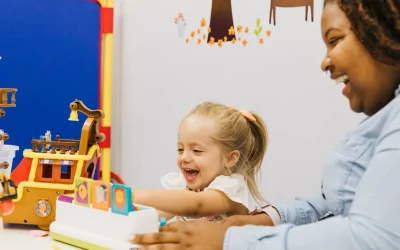The first months and years of your child’s life are an exciting time, and arguably some of the most important. When your child is young, they develop skills and learn things quickly, practicing their motor skills and communication with everything they do. If your child is on the autism spectrum, that development can look different and be delayed. As such, it is very important for parents to understand developmental milestones and how to measure their child’s developmental progress.
In this post, we’ll talk about resources for tracking developmental milestones, and what to look out for as your child builds their skills.
Developmental Milestones
As your child learns and grows they are expected to hit certain benchmarks in their development. Those benchmarks are known as developmental milestones. The CDC has a comprehensive list of those milestones broken down by months and years. They include some of the following benchmarks:
- Smiling, cooing, paying attention to faces and holding their head up at 2 months.
- Recognizing familiar faces, looking at themselves in the mirror, and beginning to sit without support at 6 months.
- Responding to simple requests, cruising and standing with support or on their own at 1 year.
- Sorting shapes and colors, speaking in short sentences and remembering names and faces at 2 years.
These milestones help professionals decide if your child is progressing at a healthy rate, and can help behavioral specialists screen for autism and other neurodevelopmental disorders.
Developmental Screenings
You know your child best, but that doesn’t mean you’re alone in their care. Physicians and pediatricians are there to consult you and answer any questions you might have about your child’s development. Ask them about developmental screenings at every check-up.
For pre-school age children, those screenings can make a world of difference for the rest of their development. Developmental screenings are designed to find any gaps in your child’s progress and can serve as the first step to seeking an appropriate early intervention program for your child. If you have any concerns, point them out to your doctor as soon as possible to request a screening. You can also find plenty of resources online or through your local school system or therapy provider to measure your child’s development on your own.
Standardized Assessments
Standardized developmental assessments help measure your child’s progress against a standard benchmark to ensure the intervention and therapy they’re receiving is what’s best for their needs and skills. The Place for Children with Autism utilizes a variety of tools to measure developmental progress including neurotypical developmental milestones, standardized assessments, and school readiness screenings. These measurements help ensure that your child’s individualized treatment plan is working to support your child’s independence and continued development.
For more ABA and autism related news and tips, don’t hesitate to reach out to us on our contact page, visit our blog, and follow us on Facebook, Instagram, and Twitter. We’re always here to answer your questions and support your family’s needs as best as we can.



